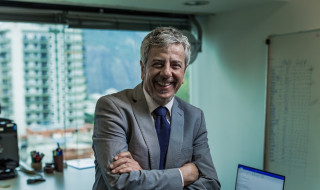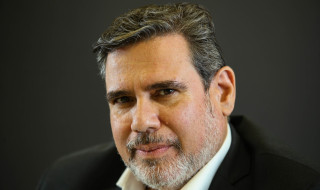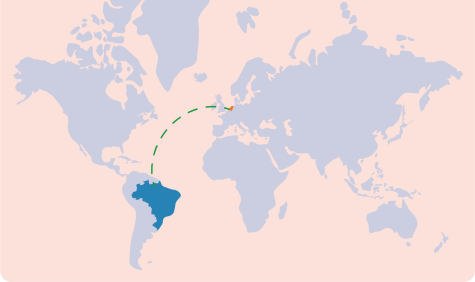“The rivers are our roads. Not only for freight and people, but now also for data.”
Creative collaboration in Brazil
"Our work is more than connectivity. It is connection," RNP says on its website. What does Brazil's NREN mean by that? Two of its directors talk about what they do, and why.
No Teams this time and no Zoom either: the interview is via Conferência Web, the videoconferencing service that RNP co-developed. Both directors speak animatedly about what more RNP is up to. Antônio Carlos Fernandes Nunes: "We are Latin Americans. We like to talk!"
Amazon
He and his colleague Eduardo Grizendi do have a lot to talk about, as they serve a huge country. Brazil is 200 times the size of the Netherlands and has over 200 million inhabitants.
It is also a country with big contrasts. To the south, you have metropolises like Sao Paulo and Rio de Janeiro, but the north is as empty as it is vast: 60% of Brazil's territory for just 28 million people. And from the coast, the deepest parts of the jungle are further away than Africa.

The few cities are mainly along the banks of the Amazon and its tributaries. "Those rivers are our roads," says Eduardo. "Not only for freight and people, but now also for data."
How that works? About three years ago, the Brazilian government decided that the north needed to be better connected, including digitally. But instead of cutting down tens of millions of trees, fibre-optic cables are now being laid on the bottoms of rivers. In a few years, 12,000 kilometres of cable along these ‘roads’ should connect millions of people to each other and to the rest of the world.
Innovative collaboration
Eduardo talks enthusiastically about the big project - Norte Conectado. In the jungle, you have to work together to survive. Collaboration is also what RNP is doing to open up the Amazon.
"If we have dark fibre capacity left over, we give it to ISPs in exchange for relevant other sections of network or maintenance of metropolitan optical cables."
"We were already used to working with commercial internet service providers (ISPs) and network operators, for example, in building metropolitan networks, to connect our universities. Our Norte Conectado project is divided into a number of sub-projects for as many sections. For each, RNP has set up a consortium with regional partners (ISPs and network operators) who will maintain the section in exchange for a share of the optical infrastructure. So, the government funds the construction, but the private sector funds the maintenance, through the consortium that acts a ‘neutral operator’".

"This shows how an NREN can help realise innovative business models," Antônio Carlos notes with satisfaction.
Barter
In working with companies, RNP is very flexible anyway, says Eduardo. "If we have dark fibre capacity left over, we give it to ISPs in exchange for relevant other sections of network or maintenance of metropolitan optical cables. We do a lot of deals like that."
Another example is the exchange for space and power with large national private data center providers. “The exchange of excess capacity in our infrastructure is enabling the creation of national data centers, which will host new services for our community, such as colocation, storage, hybrid cloud or shared AI infrastructure, with reduced operational costs over time”, says Antônio Carlos.
RedCLARA
RNP also cooperates internationally. Central to this is RedCLARA. Eduardo is chairman of the board of this alliance of NRENs in Latin America.
The participating organisations are sharing a lot: "Services like eduroam, but also expertise, projects, people ... It really is a big family," says Antônio Carlos.
But of course, connectivity is essential. And that is not always easy to achieve. The other countries of South America are effectively in a crescent around Brazil. RedCLARA's backbone only reaches the capital cities, which are mostly on the coast. Like in Brazil, the inlands are often poorly connected. With its own network extensions, RNP is now making it possible for ISPs in the border areas of neighbouring countries to offer high-speed connections via connections to ISPs in Brazil.
"The Amazon is tough. But all those islands are really challenging!"
And RedCLARA's backbone is also connected to the rest of the world via Brazil. For example, to RedCLARA's European counterpart Géant. In fact, the European Union supports RedCLARA with two initiatives: Bella and Bella II. The first brought a direct connection from Brazil to Portugal, plus a 100 Gb/s backbone from Brazil to several other countries.
The ambition with BELLA II is to also connect Central America and as many Caribbean islands as possible. Eduardo: "The Amazon is tough. But all those islands are really challenging!"
With good connectivity, however, there are many gains to be made. Not least where cooperation with European institutions is concerned.

The Amazon river
Klaas Wierenga
There are a lot of differences between RNP and SURF. With more than 500 employees - plus a large number of partner organisations - Brazil's NREN serves as many as 800 organisations; not only universities and research institutes, but also innovative companies, for instance. "Our campus networks are gigabit-level, and we offer more than 700 Gb/s aggregate capacity," explains Antônio Carlos. "And we offer many services, such as identity federations, digital certificates and security. We also provide all kinds of courses through our Escola Superior de Redes."
Brazil now has probably the world's largest eduroam network, with more than 3,800 sites
But in doing so, RNP keeps an open eye to best practices at other NRENs. "We learn a lot from SURF." They immediately come up with Klaas Wierenga, the "father of eduroam". Brazil now has probably the world's largest eduroam network, with more than 3,800 sites.
Ordinary people
That network is likely to get much bigger. This is because RNP is broadening its scope to public schools. This is not so much about connectivity, but about new models of services and solutions to support those schools.
There is plenty to do for RNP: "Brazil is a big country with many challenges," says Antônio Carlos. "We are trying to improve that, to change conditions by democratizing access to knowledge."
Eduardo heartily agrees: "Who are our clients? They are the people studying and researching. With our work, we can help to change their lives.”
Text: Aad van de Wijngaart
"Creative collaboration in Brazil" is an article of SURF Magazine.
Questions about this article? Send an email to magazine@surf.nl.
